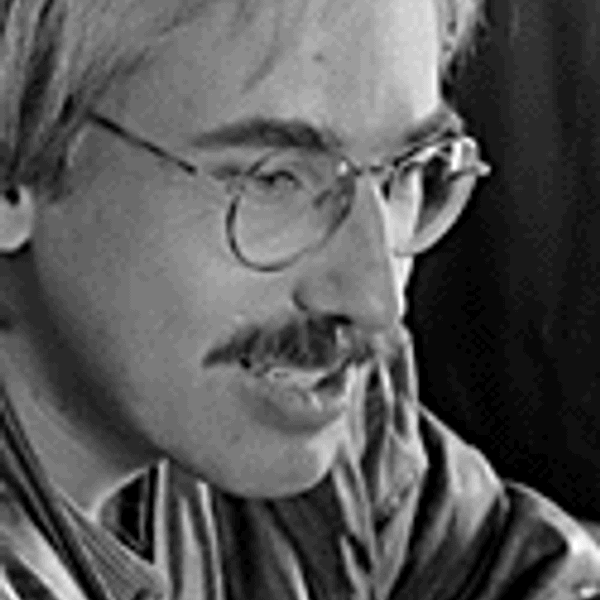Lia Purpura, Skate’s Egg Case (detail), featured in AGNI 102
To Tease a Shadow: In Memoriam, JB
Once, at a friend’s apartment, a laureate lay on the floor. At first all I could see was his arm, which had become a cigarette stand. From out of a cloud, his voice, urgent and nasal, rose in complaint. The poet was bemoaning a bad review of his new book. I was shocked—not that he’d gotten a negative notice, but that he cared. This was already some years after he’d copped a Nobel Prize.
Another time, we were having a cigarette, standing, on poet Jonathan Aaron’s porch in Cambridge when, seized by some ancestral spirit, I began speaking to Joseph Brodsky in Ukrainian. His rebuke, gentle but firm, was: “Well, you know, Askold, this is America. Let us speak English, ja?” And so we did.
The young rebel who told the Russian judge he wrote for God didn’t have much to learn about courage except how to hang onto it. With age, his notorious insouciance developed into an almost metaphysical hatred of bullies. It was Brodsky who wrote the coda to Mandelstam’s poem on Stalin, and whose life showed that in the war between truth and power there is no contest—if you’re willing to take the long view. His life played out, with high drama, the tension between the individual and the collective, the one and the many—and it wasn’t always easy pegging which he was. An indecorous formalist, he was an elitist who believed poetry should be sold in supermarkets; a democrat who chose his companions from the inner circles of art, freely excluding centuries and entire cultures from the ranks of the civilized. In short, Brodsky was the many in the one—a paradox Whitman would have understood. Even as an émigré—a condition inviting cowardice—he refused to conform or play the game. When the scoundrel Yevtushenko was invited to join the American Academy, Brodsky resigned—and now few people will understand why. It’s as though, with his death, a book essential for grasping our own history has been put on a very high shelf, nearly out of reach.
The poems matter more than ever now. Several of his will last in memory as long as memory lasts. The first time I read So Long Had Life Together Been, standing in the Grolier Book Shop, I knew more intimately the tears of things—and I understood better the narrator at the end of Isaac Babel’s great story Guy de Maupassant “as the foreboding of some essential truth touched me with light fingers.”
Naturally, I bought the book—and some years later Brodsky, finding himself at a reading without a copy of his own poems (these, remember, were translations—the Russian versions he knew by heart) borrowed mine and later tried walking off with it. The inscription in my foxed and winestained paperback of A Part of Speech reads: “For Askold / his nearly stolen book.”
Perhaps the verse of his I love best is the last of the “Roman Elegies” from To Urania:
Lean over. I’ll whisper something to you: I am
grateful for everything: for the chicken cartilage
and for the chirr of scissors already cutting
out the void for me—for it is your hem.
Doesn’t matter if it’s pitch-black, doesn’t matter if
it holds nothing: no ovals, no limbs to count.
The more invisible something is,
the more certain it’s been around,
and the more obviously it’s everywhere. You
were the first to whom all this happened, were you?
For a nail holding something one would divide by two—
were it not for remainders—there is no gentler quarry.
I was in Rome. I was flooded by light. The way
a splinter can only dream about.
Golden coins on the retina are to stay—
enough to last one through the whole blackout.
I usually urge readers to let writers know when something’s moved them yet I don’t always act on the impulse myself, and I regret it long after the moment has passed.

Askold Melnyczuk
Askold Melnyczuk—the founding editor of AGNI, for which he received the PEN/Nora Magid Award for Magazine Editing—is the author of four novels and a book of stories. What Is Told (Faber, 1994), was the first commercially published work of fiction in English to highlight the Ukrainian refugee experience and was named a New York Times Notable. Other novels have been selected as a Los Angeles Times Best Book of the Year and an Editor’s Choice by the American Library Association’s Booklist. His most recent book is a collection of stories, The Man Who Would Not Bow. His selected poems, The Venus of Odesa, is forthcoming from Mad Hat in summer 2025. A book of selected nonfiction, With Madonna in Kyiv: Why Literature Still Matters (More than Ever), will be published by Harvard University Press in 2026. He has edited a book of essays on the St. Lucian Nobel Prize–winning poet Derek Walcott and is coeditor of From Three Worlds, an anthology of Ukrainian writers from the 1980s generation. He’s the recipient of a Lila Wallace-Reader’s Digest Writers Award for fiction, the Heldt Prize for translation, and the George Garret Award from AWP for his work in the literary community. Individual poems, stories, essays, and translations have appeared in The New Yorker, The Paris Review, The Gettysburg Review, The Missouri Review, and elsewhere. Also the founder of Arrowsmith Press, he has taught at Boston University, Harvard, and Bennington College and currently teaches at the University of Massachusetts Boston. (updated 5/2025)
